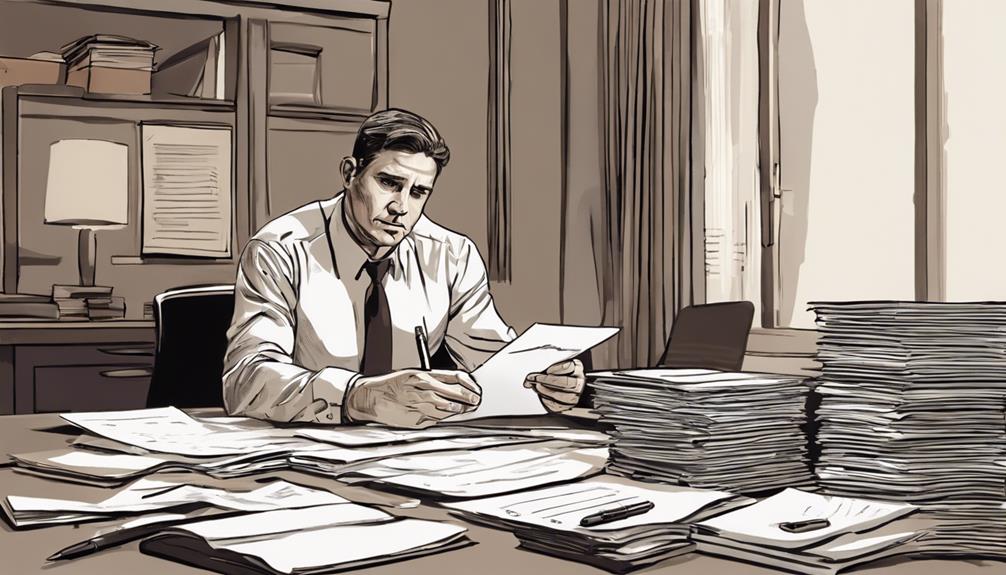When getting ready for a consultation about divorce, it is crucial to approach the conversation with a clear mind. What steps can you take to ensure you are adequately prepared for this crucial discussion with a divorce attorney?
By focusing on specific key aspects beforehand, you can make the most out of your consultation and lay a strong foundation for the next steps in your journey. Let's explore how proper preparation can set the tone for a productive interaction and help you navigate the complexities of this process with confidence.
Key Takeaways
- Gather all financial and legal documents for the consultation.
- Define your goals and concerns clearly before meeting with the attorney.
- Prepare thoughtful questions about the attorney's experience and process.
- Research and choose a family law attorney wisely based on experience and reviews.
Organize Important Documents
When preparing for your divorce consultation, ensure you have all essential documents organized and readily available. Your divorce attorney will need a comprehensive overview of your financial situation, so gather documents related to assets, debts, income, and expenses. Include items such as tax returns, bank statements, investment accounts, and property deeds for a thorough review.
Additionally, prepare documentation concerning your children's information, custody arrangements, and child support needs. It's crucial to have all this documentation in order to provide your divorce attorney with a clear picture of your circumstances.
Having these documents organized and easily accessible will streamline the consultation process and allow your attorney to offer you the best guidance tailored to your situation. Make sure to keep copies of these important documents in a secure location for future reference.
Define Your Goals and Concerns

To ensure a productive divorce consultation, take the time to clearly define your goals and express any concerns you may have about the process. Identifying your main objectives for the divorce consultation, such as child custody, asset division, or spousal support, will help focus the discussion with your attorney.
It's also important to voice any specific concerns you have regarding legal implications, financial matters, or other related issues. Prioritizing your goals ensures that critical topics are addressed during the consultation.
Be prepared to discuss sensitive topics like domestic violence, infidelity, or complex financial situations openly and honestly. Clarifying any questions or uncertainties you have about the divorce process and its potential outcomes will help you make informed decisions moving forward.
Prepare Questions for the Attorney
Consider preparing a set of questions regarding the family law attorney's experience in handling divorce cases similar to yours.
Inquire about how they approach communication and provide updates during the divorce process.
Ask about their fee structure, including retainer requirements and billing practices, to ensure you understand the financial aspect.
Seek clarification on how the attorney handles conflicts of interest, if any, to prevent any potential complications.
Discuss the attorney's availability for consultations and emergency situations, ensuring they can accommodate your needs promptly.
By preparing these questions in advance, you'll be able to gather essential information during the consultation, helping you make an informed decision.
Planning your questions ahead of time shows the attorney that you're serious about your case and allows you to focus on the key aspects of their practice that are important to you.
Research Multiple Attorney Options

Begin your search for the right divorce attorney by researching at least three professionals who specialize in family law and have a proven track record of success in handling divorce cases. Look for experienced divorce attorneys who are well-versed in family law and have a history of positive outcomes in divorce proceedings.
Consider the following when evaluating potential attorneys:
- Assess Communication Styles: Determine how each attorney communicates and ensure it aligns with your preferences.
- Review Fees: Compare fee structures to understand the financial implications of each attorney's services.
- Check Online Reviews: Explore online reviews and client testimonials to gauge satisfaction levels and overall reputation.
To make an informed decision, schedule initial consultations with the selected attorneys. Additionally, seek recommendations from trusted sources such as friends, family, or legal professionals to find reputable attorneys who can best support you during this challenging time.
Establish Communication Plan
Establishing a solid communication plan with your attorney is crucial for ensuring a smooth and effective divorce process. When discussing your communication plan, make sure to clarify the preferred methods of communication. This could be through phone calls, emails, or in-person meetings. Additionally, agree on how often you can expect updates and progress reports regarding your case.
It's important to establish a protocol for urgent communication or emergencies that may arise during the legal proceedings. Ensure you know how to reach your attorney for questions or concerns outside of scheduled appointments. Finally, agree on the best way to share important documents, evidence, or information related to your case with your attorney.
Frequently Asked Questions
How Long Does the Divorce Process Typically Take in My State?
Typically, the divorce process in your state lasts several months to a few years. Factors like complexity of assets, custody agreements, and court caseloads affect the timeline. Your attorney can provide a more accurate estimate.
Will I Have to Attend Court Hearings, and if So, How Many?
You may need to attend court hearings during your divorce proceedings. The number can vary based on factors like contested issues. Your attorney will guide you through this process and ensure you are prepared.
What Are the Potential Tax Implications of My Divorce Settlement?
When considering the potential tax implications of your divorce settlement, it's crucial to understand how assets, alimony, and child support can impact your taxes. Consulting with a tax professional can provide valuable insights tailored to your situation.
Can I Request Temporary Spousal Support or Child Support During the Divorce Process?
During your divorce process, you can request temporary spousal support or child support to help with financial needs. For instance, if your spouse is the primary breadwinner, temporary support can assist you until a final agreement is reached.
How Can I Protect My Assets and Investments During the Divorce Proceedings?
To safeguard your assets and investments in divorce proceedings, document all financial records, consider a prenuptial agreement, consult with a financial advisor or attorney, and be transparent during the process. Taking proactive steps can help protect your financial future.
What Should I Expect During a Divorce Consultation?
During a divorce consultation, it’s important to come prepared with questions and documents. A comprehensive guide for preparing men can offer helpful tips on topics to discuss, such as child custody and division of assets. Being organized and informed will ensure the best outcome for your case.
Conclusion
Now that you have all your documents in order, your goals defined, and questions prepared, you're well-equipped for your divorce consultation.
Remember, the early bird catches the worm, so be proactive in researching multiple attorney options.
By being thorough and proactive, you're setting yourself up for success in navigating this challenging process.
Good luck on this new chapter in your life.










